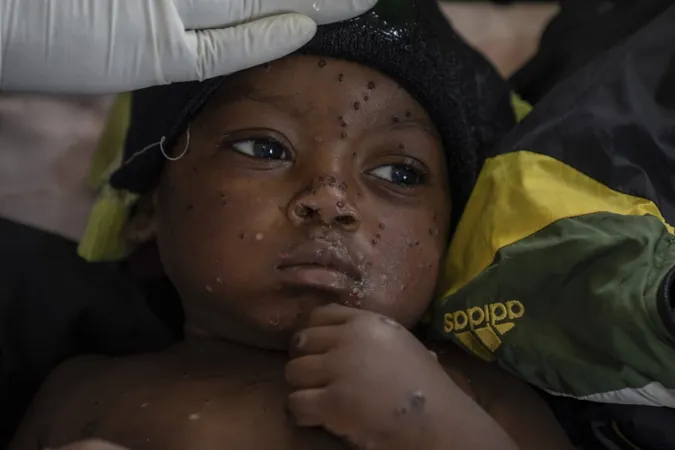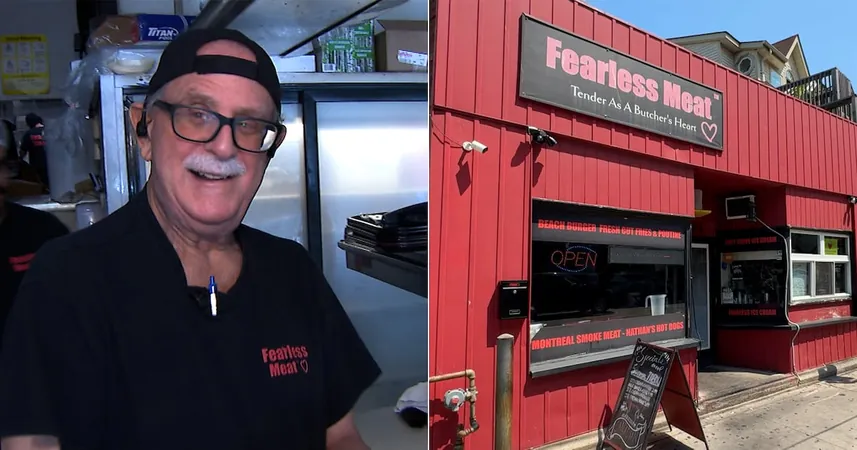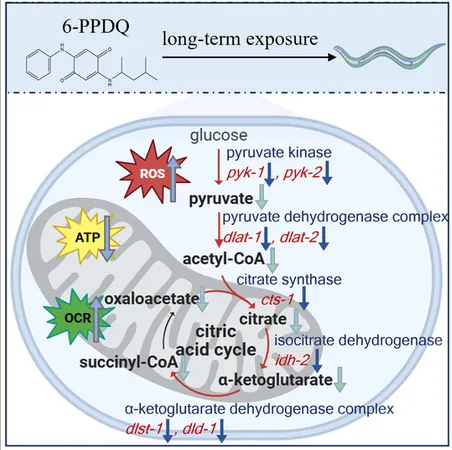
Mpox Cases in Congo Show Signs of Stabilization, but Experts Warn of Urgent Need for Vaccines
2024-11-03
Author: Sophie
GOMA, Congo
— Health officials are cautiously optimistic as mpox cases in Congo appear to be stabilizing—a promising indicator that the World Health Organization's global emergency declaration in August may be influencing the decline of this alarming epidemic.
Recent reports indicate that Congo has witnessed a reduction in cases, with approximately 200 to 300 lab-confirmed mpox cases each week, compared to nearly 400 cases weekly in July. This downward trend is particularly notable in Kamituga, the mining city in eastern Congo where a more contagious variant of mpox was first identified.
Despite these positive signals, the World Health Organization (WHO) acknowledged serious gaps in testing, revealing that only 40% to 50% of suspected infections are being officially recorded. The virus continues to spread in various regions within Congo and neighboring Uganda.
Health experts express concern over the underwhelming vaccination campaign in Congo. The country has received just 265,000 vaccine doses, with only 50,000 people immunized in a nation of over 110 million citizens. Dr. Zakary Rhissa, who oversees operations for the charity Alima in Congo, emphasized the critical need for a broader vaccination drive across the African continent to effectively curb mpox's spread and mitigate the risks of genetic mutations.
The urgency of action is underscored by the staggering statistics of the outbreak: about 43,000 suspected cases have been reported in Africa this year, leading to over 1,000 fatalities, primarily in Congo. Historical precedent illustrates the potential severity of uncontained outbreaks, as seen with Nigeria's 2017 incident that ultimately contributed to the global mpox outbreak in 2022, which impacted over 100 countries.
Vaccination and Awareness Efforts
In Kamituga, where initial transmission occurred among miners and sex workers, Pr Dr. Rhissa sees an opportunity to establish stronger vaccination programs, coupled with enhanced surveillance and health education initiatives.
Georgette Hamuli, an 18-year-old sex worker from Goma, reveals how the arrival of vaccination teams has raised awareness among high-risk populations. "They told us we're highly exposed to the risk of infection," she shares, acknowledging the challenges sex workers face in insisting on safe practices with clients.
Local efforts are supplemented by small financial incentives for vaccination; however, Hamuli recognizes the vaccine's significance beyond the monetary reward. "The vaccine is also necessary. I think we're now protected," she affirmed.
Urgent Need for Vaccines
Urging a renewed commitment, the Africa Centers for Disease Control and Prevention estimates that Congo alone requires at least 3 million mpox vaccines, with an additional need for 7 million doses across the continent. While WHO has allocated 900,000 vaccines to nine African nations impacted by mpox, the anticipated availability of 6 million additional doses by the end of the year falls short of demand.
Notably, the origins of mpox outbreaks in neighboring countries like Burundi, Kenya, Rwanda, and Uganda trace back to Congo, complicating the regional public health landscape. Cases have also emerged in far-off locations, including Sweden, Thailand, Germany, India, and the UK.
Challenges and Public Health Approach
Heather Kerr, Congo director for the International Rescue Committee, emphasizes that fewer than half of the most vulnerable populations have received vaccinations. "We only have a tiny amount of vaccines, and nothing for the kids," she points out.
The vaccines currently administered in Congo come largely from donor nations such as the United States and UNICEF, raising concerns about the sustainability of supply and the need for an expansive public health strategy. “What we need is a public health approach where we immunize populations at scale,” warns Dr. Chris Beyrer, director of the Global Health Institute at Duke University.
Meanwhile, Bavarian Nordic, the manufacturer of the leading mpox vaccine, has pledged to offer vaccines for African countries at the lowest price possible—a commendable step, yet still problematic considering the notable $65 price tag per dose for UNICEF.
Conclusion
In light of the complex dynamics at play, such as sexual transmission and zoonotic spillover from infected animals, experts like Dr. Salim Abdool Karim of South Africa’s University of KwaZulu-Natal contend that merely waiting for cases to decline without widespread vaccination would prove ineffective. "We’re in new territory with mpox this time. But we’re never going to solve this until we vaccinate most of our people."
As Congo stands at a critical juncture in its battle against mpox, the collective commitment to vaccination and public health initiatives may spell the difference between control and a resurgence of this formidable virus.









 Brasil (PT)
Brasil (PT)
 Canada (EN)
Canada (EN)
 Chile (ES)
Chile (ES)
 Česko (CS)
Česko (CS)
 대한민국 (KO)
대한민국 (KO)
 España (ES)
España (ES)
 France (FR)
France (FR)
 Hong Kong (EN)
Hong Kong (EN)
 Italia (IT)
Italia (IT)
 日本 (JA)
日本 (JA)
 Magyarország (HU)
Magyarország (HU)
 Norge (NO)
Norge (NO)
 Polska (PL)
Polska (PL)
 Schweiz (DE)
Schweiz (DE)
 Singapore (EN)
Singapore (EN)
 Sverige (SV)
Sverige (SV)
 Suomi (FI)
Suomi (FI)
 Türkiye (TR)
Türkiye (TR)
 الإمارات العربية المتحدة (AR)
الإمارات العربية المتحدة (AR)